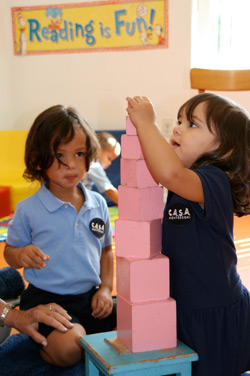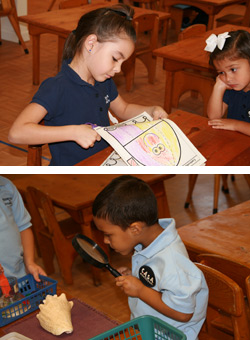THE TODDLER PROGRAM
T oddlers are the youngest members of our school community,
ranging in age from 12 months to 3 years. Each child is
helped to make choices of “work” from an array of
activities. It is through activity, that concentration and
self-confidence grow. Students may choose to water the
classroom plants, "read" a book, help prepare the snack, or
paint a picture.
oddlers are the youngest members of our school community,
ranging in age from 12 months to 3 years. Each child is
helped to make choices of “work” from an array of
activities. It is through activity, that concentration and
self-confidence grow. Students may choose to water the
classroom plants, "read" a book, help prepare the snack, or
paint a picture.
Each choice, every movement, builds on
itself.
The Toddler curriculum is well-rounded and
includes:
- Language—enrichment and extension.
- Socialization—beginnings of social membership.
- Movement exploration—large and refined motor skills.
- Practical life—including care of person and bathroom independence.
- Functional independence—completion of work cycles.
- Grace and courtesy—living in community with others.
THE PRE-PRIMARY PROGRAM
B y far, our Pre-Primary class has been our
most popular Montessori program. And for good reason! Dr.
Maria Montessori's first Casa dei Bambini (Children's
House), where she began in earnest to study and serve
children, worked with individuals of this age group. She
observed that children in this age group (with what she
termed the "Absorbent Mind") could, in the appropriate
environment, learn far more than was ever imagined at that
time and perhaps, even today.
y far, our Pre-Primary class has been our
most popular Montessori program. And for good reason! Dr.
Maria Montessori's first Casa dei Bambini (Children's
House), where she began in earnest to study and serve
children, worked with individuals of this age group. She
observed that children in this age group (with what she
termed the "Absorbent Mind") could, in the appropriate
environment, learn far more than was ever imagined at that
time and perhaps, even today.
Our Pre-Primary program offers your child a comprehensive curriculum, that focuses on:
- Sensorial Activities
- Practical Life Activities
- Language Arts
- Culture & Science
- Mathematics
Our Pre–Primary class essentially covers the Pre-Kindergarten through 1st Grade level. Graduates of this program are prepared for entry into the 2nd Grade.
PROGRAM ENRICHMENTS
Music
Musical games, chants, nursery rhymes, finger plays and
songs are used to help the children develop their sense of
pitch and rhythm, and improve their coordination, focus, and
enjoyment of group activity. Children deepen their
understanding of basic musical concepts such as singing in
tune, beat, tempo, dynamics and melodic awareness. Some of
the skills being introduced in age appropriate ways include
matching a pitch with one's own voice; easiest singing
intervals; high-low pitch awareness; moving to a steady
beat; responsibility to group activity and sound; learning
by repetition; and musical structure.
Art
Children are encouraged to use their imagination through
experimentation. From the beginning, work with the
Montessori sensorial materials helps to refine the sense of
color, balance and design, preparing the child to see
harmony in his/her surroundings and using this in artistic
expression. The art environment is planned, set up and
maintained by the teacher, as are the activities, so that
the children can function independently to use their
materials and tools, work in their space, and most
importantly, create their own unique pieces of art.
Spanish / French
The children will be taught various colors, numbers, short
phrases, months, and days of the weeks in Spanish and
French; music will also be introduced. Exercises designed to
explore the cultural aspects of the language are also part
of the program.
Physical Education & Nutrition
Students will be taught the importance of staying physically
active and how healthy eating habits contribute to their
overall health and well being. Team sports will teach
students to cooperate, formulate strategies and coordinate
amongst themselves. The importance of rules and playing
within a structured environment will also be emphasized.
